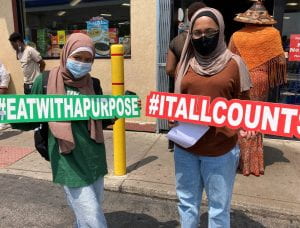Home | Unit 1 | Unit 2 | Unit 3 | Unit 4

Activities
- 4.1 Step In
- 4.2 Voices in Justice
- 4.3 Reimagine Our Food System
- 4.4 Rooting Ourselves
- 4.5 Garden Celebration
In addition to activities:
- Voices in Food Justice Spotlight: Naima Penniman- These Gardens Are Blueprints
- Food for Thought
- Project SOW Learning Standards
- Youth Action Project
Download S.O.W. Curriculum Print Friendly PDF here
Introduction
In Unit Four: Rooting Resilience, youth explore how they like to express themselves and what inspires them to take action. Reflecting upon what they have learned about food systems, the group applies this knowledge to their own community and themselves. Centering personal values, youth ponder what manageable and meaningful action they can do to start creating a community of which they want to be a part. The unit ends by planning and having a garden celebration.
Grounding in personal reflection and examples from justice activists, youth consider the different ways we can communicate information and what motivates us to create change. We hope to show youth the importance of understanding our limits and that we do not have to do it all to make a difference. There is not one right way to tackle a challenge, rather there may be ways more suitable to us and our inclinations.
Using imagination empowers young people to challenge notions of what is and what can be. Youth map out their local food system. After visualizing how the food system functions in their community, youth are encouraged to reflect upon what is working and what they would like to see differently. Thinking big picture and also in terms of manageable steps, youth set goals for themselves to take action.
To recognize the hard work they have put into this project, youth will plan and have a garden celebration. The celebration can take many forms, it is important to incorporate youth voice into the planning process. Youth will be actively involved in making decisions and shaping what the celebration will be. Celebrations offer opportunity for personal reflection and to strengthen connections among group members.
We encourage the facilitator to read over the unit and curriculum in its entirety before use, since many activities are complementary. This curriculum may at times lead to uncomfortable conversations. It is important to remember as the facilitator, it is okay to experience discomfort, and it is also okay if you do not have all of the answers; in addition, we may not find the answers. When you start to feel uncomfortable, we invite you to pause, slow down, wonder into the nature of the discomfort, and allow some “room” for it. You may not always need to speak or intervene. In fact, allowing for some space in which to reflect is an important part of engaging with justice.
Target Objectives
- Reflect upon how one likes to express themselves and what inspires one to take action.
- Evaluate quotes from prominent justice activists.
- Construct a map of the community food system.
- Formulate a vision for what they want the food system to be.
- Understand how to and the joy of using inner beliefs to inform outer actions.
- Collaborate with group members to plan and have a garden celebration.


